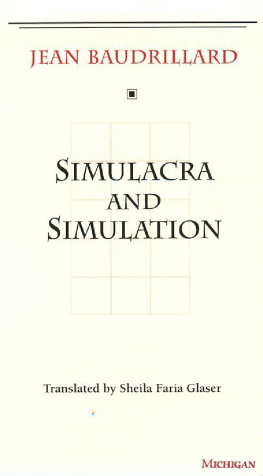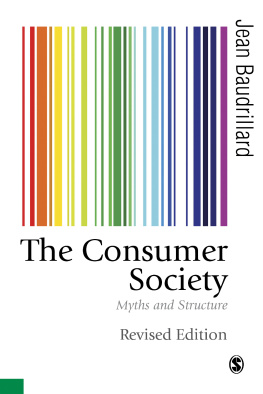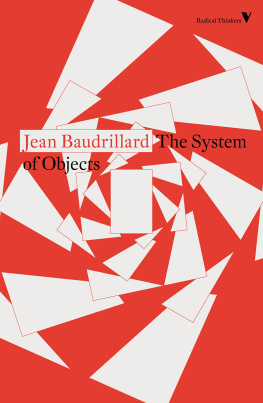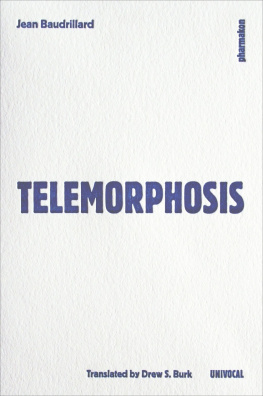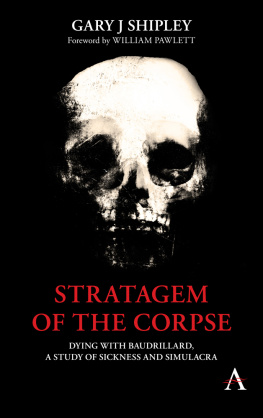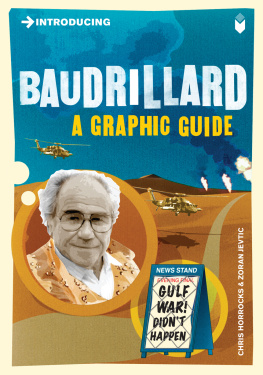Jean Baudrillard - Simulacra and Simulation
Here you can read online Jean Baudrillard - Simulacra and Simulation full text of the book (entire story) in english for free. Download pdf and epub, get meaning, cover and reviews about this ebook. year: 2011, publisher: ePub Bud, genre: Religion. Description of the work, (preface) as well as reviews are available. Best literature library LitArk.com created for fans of good reading and offers a wide selection of genres:
Romance novel
Science fiction
Adventure
Detective
Science
History
Home and family
Prose
Art
Politics
Computer
Non-fiction
Religion
Business
Children
Humor
Choose a favorite category and find really read worthwhile books. Enjoy immersion in the world of imagination, feel the emotions of the characters or learn something new for yourself, make an fascinating discovery.
- Book:Simulacra and Simulation
- Author:
- Publisher:ePub Bud
- Genre:
- Year:2011
- Rating:4 / 5
- Favourites:Add to favourites
- Your mark:
- 80
- 1
- 2
- 3
- 4
- 5
Simulacra and Simulation: summary, description and annotation
We offer to read an annotation, description, summary or preface (depends on what the author of the book "Simulacra and Simulation" wrote himself). If you haven't found the necessary information about the book — write in the comments, we will try to find it.
Simulacra and Simulation — read online for free the complete book (whole text) full work
Below is the text of the book, divided by pages. System saving the place of the last page read, allows you to conveniently read the book "Simulacra and Simulation" online for free, without having to search again every time where you left off. Put a bookmark, and you can go to the page where you finished reading at any time.
Font size:
Interval:
Bookmark:
I. The Precession of Simulacra
II. History: A Retro Scenario
III. Holocaust
IV. The China Syndrome
V. Apocalypse Now
VI. The Beaubourg Effect : Implosion and Deterrence
VII. Hypermarked and Hypercommodity
VIII. The Implosion of Meaning in the Media
IX. Absolute Advertising, Ground-Zero Advertising
X. Clone Story
XI. Holograms
XII. Crash
XIII. Simulacra and Science Fiction
XIV. The Animals: Territory and Metamorphoses
XV. The Remainder
XVI. The Spiraling Cadaver
XVII. Value's Last Tango
XVIII. On Nihilism
The simulacrum is never what hides the truth - it is truth that hides the fact that there is none.
The simulacrum is true.
-Ecclesiastes
If once we were able to view the Borges fable in which the cartographers of the Empire draw up a map so detailed that it ends up covering the territory exactly (the decline of the Empire witnesses the fraying of this map, little by little, and its fall into ruins, though some shreds are still discernible in the deserts - the metaphysical beauty of this ruined abstraction testifying to a pride equal to the Empire and rotting like a carcass, returning to the substance of the soil, a bit as the double ends by being confused with the real through aging) - as the most beautiful allegory of simulation, this fable has now come full circle for us, and possesses nothing but the discrete charm of second-order simulacra.*1
Today abstraction is no longer that of the map, the double, the mirror, or the concept. Simulation is no longer that of a territory, a referential being, or a substance. It is the generation by models of a real without origin or reality: a hyperreal. The territory no longer precedes the map, nor does it survive it. It is nevertheless the map that precedes the territory - precession of simulacra - that engenders the territory, and if one must return to the fable, today it is the territory whose shreds slowly rot across the extent of the map. It is the real, and not the map, whose vestiges persist here and there in the deserts that are no longer those of the Empire, but ours. The desert of the real itself.
In fact, even inverted, Borges's fable is unusable. Only the allegory of the Empire, perhaps, remains. Because it is with this same imperialism that present-day simulators attempt to make the real, all of the real, coincide with their models of simulation. But it is no longer a question of either maps or territories. Something has disappeared: the sovereign difference, between one and the other, that constituted the charm of abstraction. Because it is difference that constitutes the poetry of the map and the charm of the territory, the magic of the concept and the charm of the real. This imaginary of representation, which simultaneously culminates in and is engulfed by the cartographers mad project of the ideal coextensivity of map and territory, disappears in the simulation whose operation is nuclear and genetic, no longer at all specular or discursive. It is all of metaphysics that is lost. No more mirror of being and appearances, of the real and its concept. No more imaginary coextensivity: it is genetic miniaturization that is the dimension of simulation. The real is produced from miniaturized cells, matrices, and memory banks, models of control - and it can be reproduced an indefinite number of times from these. It no longer needs to be rational, because it no longer measures itself against either an ideal or negative instance. It is no longer anything but operational. In fact, it is no longer really the real, because no imaginary envelops it anymore. It is a hyperreal, produced from a radiating synthesis of combinatory models in a hyperspace without atmosphere.
By crossing into a space whose curvature is no longer that of the real, nor that of truth, the era of simulation is inaugurated by a liquidation of all referentials - worse: with their artificial resurrection in the systems of signs, a material more malleable than meaning, in that it lends itself to all systems of equivalences, to all binary oppositions, to all combinatory algebra. It is no longer a question of imitation, nor duplication, nor even parody. It is a question of substituting the signs of the real for the real, that is to say of an operation of deterring every real process via its operational double, a programmatic, metastable, perfectly descriptive machine that offers all the signs of the real and short- circuits all its vicissitudes. Never again will the real have the chance to produce itself - such is the vital function of the model in a system of death, or rather of anticipated resurrection, that no longer even gives the event of death a chance. A hyperreal henceforth sheltered from the imaginary, and from any distinction between the real and the imaginary, leaving room only for the orbital recurrence of models and for the simulated generation of differences.
THE DIVINE IRREFERENCE OF IMAGES
To dissimulate is to pretend not to have what one has. To simulate is to feign to have what one doesn't have. One implies a presence, the other an absence. But it is more complicated than that because simulating is not pretending: "Whoever fakes an illness can simply stay in bed and make everyone believe he is ill. Whoever simulates an illness produces in himself some of the symptoms" (Littr). Therefore, pretending, or dissimulating, leaves the principle of reality intact: the difference is always clear, it is simply masked, whereas simulation threatens the difference between the "true" and the "false," the "real" and the "imaginary." Is the simulator sick or not, given that he produces "true" symptoms? Objectively one cannot treat him as being either ill or not ill. Psychology and medicine stop at this point, forestalled by the illness's henceforth undiscoverable truth. For if any symptom can be "produced," and can no longer be taken as a fact of nature, then every illness can be considered as simulatable and simulated, and medicine loses its meaning since it only knows how to treat "real" illnesses according to their objective causes. Psychosomatics evolves in a dubious manner at the borders of the principle of illness. As to psychoanalysis, it transfers the symptom of the organic order to the unconscious order: the latter is new and taken for "real" more real than the other - but why would simulation be at the gates of the unconscious? Why couldn't the "work" of the unconscious be "produced" in the same way as any old symptom of classical medicine? Dreams already are.
Certainly, the psychiatrist purports that "for every form of mental alienation there is a particular order in the succession of symptoms of which the simulator is ignorant and in the absence of which the psychiatrist would not be deceived." This (which dates from 1865) in order to safeguard the principle of a truth at all costs and to escape the interrogation posed by simulation - the knowledge that truth, reference, objective cause have ceased to exist. Now, what can medicine do with what floats on either side of illness, on either side of health, with the duplication of illness in a discourse that is no longer either true or false? What can psychoanalysis do with the duplication of the discourse of the unconscious in the discourse of simulation that can never again be unmasked, since it is not false either?*2
What can the army do about simulators? Traditionally it unmasks them and punishes them, according to a clear principle of identification. Today it can discharge a very good simulator as exactly equivalent to a "real" homosexual, a heart patient, or a madman. Even military psychology draws back from Cartesian certainties and hesitates to make the distinction between true and false, between the "produced" and the authentic symptom. "If he is this good at acting crazy, it's because he is." Nor is military psychology mistaken in this regard: in this sense, all crazy people simulate, and this lack of distinction is the worst kind of subversion. It is against this lack of distinction that classical reason armed itself in all its categories. But it is what today again outflanks them, submerging the principle of truth.
Font size:
Interval:
Bookmark:
Similar books «Simulacra and Simulation»
Look at similar books to Simulacra and Simulation. We have selected literature similar in name and meaning in the hope of providing readers with more options to find new, interesting, not yet read works.
Discussion, reviews of the book Simulacra and Simulation and just readers' own opinions. Leave your comments, write what you think about the work, its meaning or the main characters. Specify what exactly you liked and what you didn't like, and why you think so.

